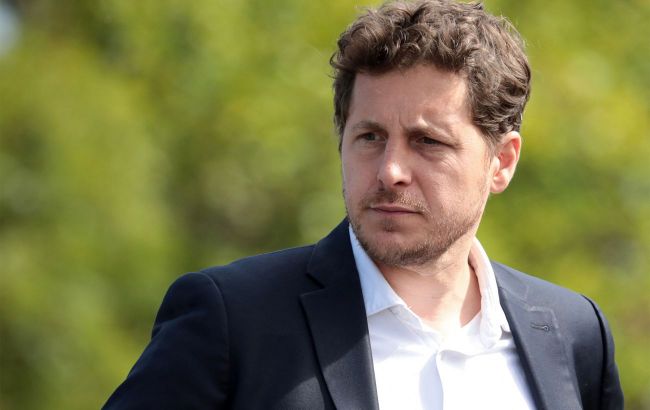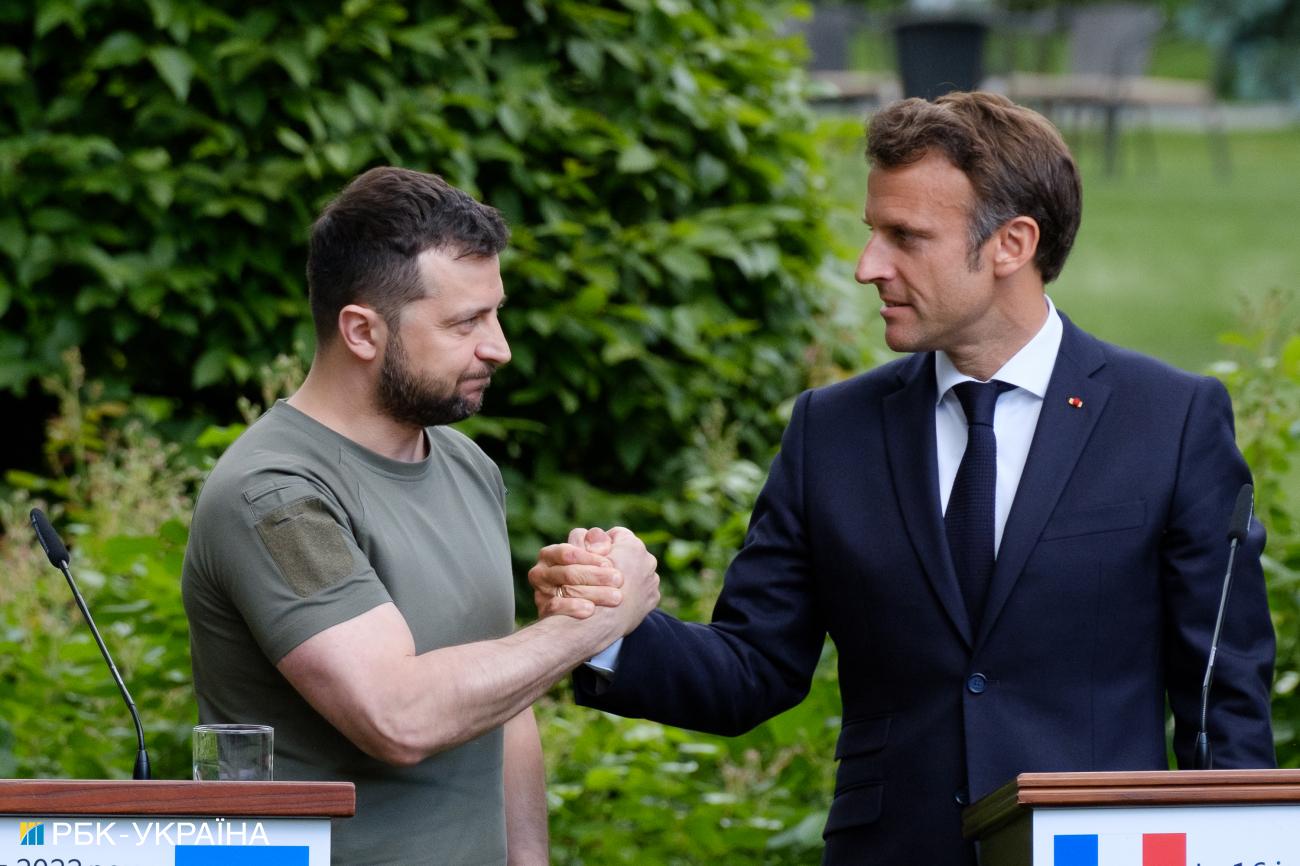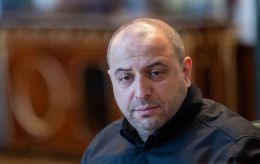Julien Bayou: Forced peace for Ukraine is not on table for France
 French MP Julien Bayou (Getty Images)
French MP Julien Bayou (Getty Images)
In an interview with RBC-Ukraine, Julien Bayou, a member of the French National Assembly, discussed French President Emmanuel Macron's ideas about sending troops to Ukraine and the French public's reaction to them. He also touched on the place of the Ukraine-Russia war in France's political agenda, the threat of a Russian invasion of NATO countries, and the pressure on Ukraine to negotiate.
This year, France, under President Emmanuel Macron, has clearly taken the lead in the geopolitical agenda concerning the Ukraine-Russia war. Macron's ideas about potentially sending troops to Ukraine are far from being realized, but they have sparked a wave of discussions both within France and among its NATO allies.
Julien Bayou, a National Assembly deputy (the lower house of the French Parliament), former leader of the Ecologists Green party, and vice-president of the France-Ukraine friendship parliamentary group, acknowledges in his conversation with RBC-Ukraine that he does not fully agree with Macron's ideas. However, he notes that these ideas have managed to bring Ukraine back to the forefront of French news.
Bayou believes that statements about "unlimited support for Ukraine" need to be backed by concrete actions. He co-authored a resolution on confiscating billions of Russian assets frozen in Europe and using them to support Ukraine. "Our goal is to say: we need to support Ukraine to win. Whereas in the last months, it was more that we need to support Ukraine so that it does not lose. And it's totally different," says Bayou.
- How important is Ukraine and the war in Ukraine to French society, generally? What is its place in the French political agenda as of now?
- It's been like an earthquake in 2022 when the war broke out because Europe and the European continent were seen as a land of peace. And the French society particularly thought that the war could not break out ever again. Of course, we remember Yugoslavia, but it was seen as a civil war. And Russian aggression in the Donbass in 2014 was more latent, it was not a high-intensity conflict.
So it has been really like an earthquake and since then we have tried to wake up French society by saying that this is an alert and that it is basically right to support Ukraine. It is the right thing to do.
Ukrainians fight for themselves, but they are also defending France and Europe. And with a few MPs, experts, military, obviously, the French NGOs that support the Ukraine-France relationship this is what we are trying to frame, to explain. The chapter of the United Nations, there is Article 51 that says we must collectively defend when a state member is attacked by another one.
There are war crimes, there is ecocide, environmental disasters, and the deportation of children. We all have seen Bucha.
So there is a clear morality, but we also need to fully understand the threats, the existential threats that Vladimir Putin's regime poses to Europe and to France. So right now our goal is to say: we need to support Ukraine to win. Whereas in the last months, it was more that we need to support Ukraine so that it does not lose. And it's totally different. We need a global win. We need a clear win. We need Putin out of business and Russia out of Ukraine, Crimea included, obviously.
I think the landscape is moving. It was very very difficult to see where President Macron was heading. Because he was one of the last in Europe, or perhaps in the world, to speak with Putin, hoping to ease him.
And I was very shocked that we invited Putin to Versailles, to Brégançon, or by the fact is that he did not want to humiliate Russia. And now there is a switch: he finally says we need Ukraine to win. And it's a big switch, it's very important.
I'm a pacifist. So it is not easy. But as Desmond Tutu said, If you are neutral in situations of injustice, you have chosen the side of the oppressor. It's a legitimate defense and we need a clear victory of Ukraine and for Europe.
- And what about the public attention to this war, is it still on the front pages of your top newspapers? Is it widely debated in evening political TV shows?
- Obviously, since October 7th and terrorist attacks in Israel Ukraine has been, pushed a bit aside. But we have one information channel, it's called LCI, that has very extended coverage of what happens in Ukraine. And it's a choice, it's a political choice they made in 2022. I mean, you open LCI and you have news about Ukraine all the time. And I talked with the journalists of LCI and they are very happy with the numbers of the audience.
So it's very concerning in the background because, for example, what happens to the price of gas in France is very directly linked to the Ukraine war, although there is a lot of speculation. And the fear that Trump could win in November is very widely discussed regarding Ukraine's support and NATO, France in NATO, and so on. So it's like in the background it's very discussed. Although I do not fully agree with everything Macron said a month ago, it had a merit, to put Ukraine back on the front news.

Presidents of Ukraine and France Volodymyr Zelenskyy and Emmanuel Macron in Kyiv, June 2022 (photo: Vitaliy Nosach / RBC-Ukraine)
- President Macron's recent initiatives and ideas regarding the war in Ukraine have been on the top of the political agenda of the European Union, they are very widely discussed. And this marks really a very significant change because some time ago he used quite a different type of rhetoric and behavior. How deep is this change of concept and how irreversible it is? So in your opinion, may President Macron turn back to this peaceful manner of doing things instead of what we see now?
- I hope he won't. I'm in the opposition, so I cannot read his mind, and the guys that support him cannot read his mind too. We have institutions in France where the president has way a lot more power than in any other Western democracy. I mean, the German Chancellor is in a coalition, he must discuss everything with his ministers because he appointed them, but it's like a political alliance.
It's very, very different in France. The president is lonely, you don't know who he's talking to and who has influence on him. But right now his position is interesting.
My concern is that we need to be coherent. It's a good thing to say that we need to go for the win in Ukraine, for Ukraine to win against Russia. But we need to be consistent. I'm pushing for the confiscation of the frozen Russian assets. And I don't understand why the President is shy with this retaliation. You can say 'no limits for the support of Ukraine' and that we will have soldiers that could die on the soil of Ukraine and shy before the seizing of frozen assets.
Let's take this money and give it to Ukraine for military purposes and for rebuilding the country. That's, in my view, the most concrete, the most immediate concrete support we can provide. And I don't understand how you can say 'no limits' and entertain this ambiguous position.
And this is a problem for France too, because the government announced a budget cut of 10 billion, for public services, for education, for health care and so on. So the population might not understand how you can cut 10 billion for public services and give 3 to Ukraine. The best explanation is that this is an investment. But also to ease the move for the taxpayers – we will seize these 200 billion and it will help a lot more than the French taxpayers could ever do. So I don't really understand this contradiction and to be fully believed, France must seize and confiscate the Russian assets and Europe should do the same.
And this position is very, very widely shared. We have around 150 MPs, it's more than 25% of the MPs in France that support, that signed the resolution to seize this money. We want to vote, we want to go for this bold move and the president is holding back.
- And how are President Macron's initiatives regarding the possibility to send French troops to Ukraine, perceived in France itself, both among the ordinary people and among the political parties?
- It is not supported. I think it was a little bit, I don't know, clumsy. Because when you say 'soldiers on the soil' (French soldiers on Ukrainian soil - ed.), in France the population immediately thought that it is about the return of the conscription.
It's one thing to say, well, we provide high-technology munitions and artillery, and instead of having the maintenance and the soldiers in the east of Poland, we will have them in the west of Ukraine to provide more direct support. That's one thing everybody could perhaps understand.
But it was told in a manner that the population could understand that France will, you know, mobilize millions of population to send them to Ukraine. It was not understood and it is definitely not supported.
And because we are close to European elections, some of the political movements made a fuss about this to gain a little bit of momentum. My point of view is that it is a good thing to say 'no limits' but we need to take a step ahead with the confiscation of the frozen assets to show that we are not faking it. And the President said 'no limits', and that's it. So I think it was a little bit clumsy, but it's a good thing, it's important. It's a good thing that Europe aligns with Ukraine.
I think there was a speaker of the US House who said, let's send them bullets and munitions so that we don't send the boys. I think it's the right approach. Especially since the Ukraine is not calling for troops.
- I have such an impression that even the parties that used to be considered as anti-Ukrainian or pro-Russian like Marine Le Pen's party now are no longer taking such a radical position. So, is this the correct impression and how sustainable can this shift in mind be, if there is any?
- That's an interesting question, I wish I had a good answer. In the presidential election, a few parties decided to stick with Russia and they lost. There were three forces that said that Russia is legitimate to defend itself against 'provocation' and blah-blah-blah. Zemmour sticked to it and lost. Marine Le Pen switched a little bit because you had to reckon that in this war there is an aggressor and a victim. Black and white. There is such a clear morality.
But it's not irreversible. Le Pen has close ties with Russia. She could not run for office without its support. It was several millions that helped her to run. And she did not ask to be reimbursed for many years and now she has been reimbursed because she has public funding but in the past she did not and she would have been bankrupt.
As for Mélenchon, it's totally different, I think, he is blinded by anti-American imperialism bullshit. His vision is blurred.
Everything is linked to NATO at some point. NATO was almost dead and the only one guy that is responsible for Sweden or Finland to join NATO is Putin. If NATO is alive and well alive and expanding, it's only because Russia is the biggest threat ever to peace and stability in Europe for the past 50 years.
- By the way, do people in France see a real, I emphasize, real threat of Russia's possible invasion into some NATO countries, probably Baltic states?
- Not yet. It seems far. But when you look back, I mean, Georgia, Syria, Moldova, Ukraine, there is a clear line. But even the Baltic states – for France it's a bit far. Beyond Germany, it's far.
- So no real threat as of now, but in some distant future may something happen?
- I see Russia as an empire with an imperialist approach, and obviously, they consider the Baltic states a part of Russia. And I see Russia is upscaling to a war economy approach, reorganizing its army, and getting ready for the next move. If they win or obtain a semi-victory in Ukraine, the next move could be Moldova, obviously. Perhaps not the year after, but within 5 or 10 years.
And Europe should prepare itself. You know, Putin always tested the reaction. Donbas – what happens? Well, not much. Let's go further. And the big test is a threat to the Baltic States. How does Europe answer? We don't want to experiment. So this is why it's an existential question for Europe. And I don't see any future for France outside Europe, or if Europe collapses. We don't want to answer the question and the best way not to answer it is to support the full victory of Ukraine.
- Now the situation at the front is very difficult for Ukraine as the Russians have launched another massive offensive in the Kharkiv region. At the same time, in the Western media different talks about the need to search 'the ways for peace' or something like this became relevant again. So, in your opinion, can all these talks turn into non-public but political pressure by the Western leaders on our leadership to get to the table of negotiations, to make some 'painful concessions' to Russia, etc.?
- It's a very clear fear for me but I don't see it expanding. The guys that talk about 'peace' and as you say 'painful concessions' don't have any influence. It's more a political lingvo for the European elections. It's a way to not take sides and say, well, I'm for peace.
So right now, I think that the forced peace option is not on the table for France. I would say I'm pretty confident with this. France, the President, the government, the military, and most of the parliament are aligned on Ukraine should win.

